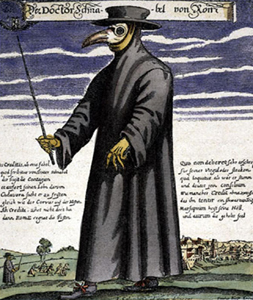�Rhetorics of Plague��An Event Sure to Catch On
 |
The mask of the plague doctor. |
With the threat of anthrax infection, anxiety about avian flu, and the continuing struggle against HIV/AIDS�to name only a few examples�the 20th and 21st centuries may seem to be the first plagued by the trauma of biohazards. But these kinds of devastating health threats have in fact been around since the beginning of recorded history. The 14th century�s bubonic plague, which wiped out 35 percent of the population of Europe, is one famous example. Such epidemics � then and now � force us to think about the relationship of human beings to their collective histories and to the world in which they live. And it can be particularly useful to think about similar pandemic events in the past in order to see ourselves and others more clearly in the contexts of science, history, politics, and even popular culture. To that end, the English Department is hosting a wide-ranging symposium on "The Rhetorics of Plague" to be held February 26-27 in the Standish Room of the Science Library.
A disastrous event, whether it is the collapse of the World Trade towers or the spread of a disease, triggers a powerful response of fear, says co-organizer Richard Barney of the English Department and an expert on early modern British philosophy and literature. "That fear is perfectly understandable, and it has been pondered by philosophers and theorists of the terrible since at least the 18th century, but it can also be dangerous and even manipulated. The question always remains: What do you do with that fear?"
The symposium will combine a focus on early historical moments�such as the Middle Ages, the Renaissance, or the Enlightenment�with postmodern logics of epidemic, trauma, and virology, in order to explore how more recent logics relate to older models of plague. The event therefore encourages participants to go beyond their own disciplinary expertise and to think in historically expansive ways within their own field. "We want to reinvigorate early studies with something that is meaningful now," says English professor Helene Scheck, who is co-organizing the symposium with Barney and whose area of expertise is medieval literature. �We also believe that studying earlier periods can help us to understand and critique our own individual and collective responses to the challenges and fears generated by biohazard today.�
"The �Rhetorics of Plague� conference illuminates the efforts towards reform and renewal that we have pursued in the English Department during the recent period,� adds English Department Chair Mike Hill. �More than that, the roster of distinguished scholars and writers included in the program offers a wide array of topics that should be of interest across the Humanities, both within and beyond UAlbany. That our students are involved at every level only makes the event that much more gratifying to witness and support."
 |
A disastrous event can trigger a powerful response of fear. |
Internationally known scholars will speak at the symposium on topics such as ecological disaster and disease in 18th-century Britain, plague, sovereignty, and 21st-century political theory, and the biopolitics of disease in the 17th century. Highlights include four keynote presentations:
- Graham Hammill, University at Buffalo, will give the Hugh Maclean Memorial Lecture on "Miracles and Plagues: Plague Discourse as Political Thought" on Thursday, Feb. 26, from 4:30-6 p.m.
- John Kelly, a visiting writer with the New York State Writers Institute, will speak on "The Great Mortality, or, the Architecture of Human Disaster," on Thursday, Feb. 26, from 8- 9:30 p.m. Kelly is an author and independent scholar currently specializing in the intersection of history with health, human behavior, and science.
- Kathleen Biddick of Temple University will give an address on "The Plague of the Sovereigns and the Return of the Leviathan" on Friday, Feb. 27, from 10:30 a.m. � noon. Biddick is a scholar of the medieval history of technology, gender, agriculture, and ethnicity.
- Robert Markley, University of Illinois, will discuss early notions of environmental contagion in ��A Putridness in the Air�: Bioregionalism, Climate, and the Etiology of Disease� on Friday, Feb. 27, at 3:15-4:45 p.m.
Other presentations at the symposium sure to attract a broad audience include: Lucinda Cole's (University of Southern Maine) talk, "I'll Do, I'll Do, and I'll Do: Witches, Rats, Food, and Early Modern Theories of Contagion�; Richard Barr's (Roche Pharmaceuticals) presentation, "Blight of the Living Dead: Unmasking the Virus in Pandemics Past and Pending"; and Wylie Lenz�s (University of Florida) paper on �Media, Capitalism, and Infection: Apocalyptic London on Film and Video.�
The event is free to all UAlbany students, faculty, and staff, as well as to students from other campuses. The cost is $10 to the public. Registration information can be found at: https://www.albany.edu/english/plague.shtml.
![]() For more news, subscribe to UAlbany's RSS headline feeds
For more news, subscribe to UAlbany's RSS headline feeds


